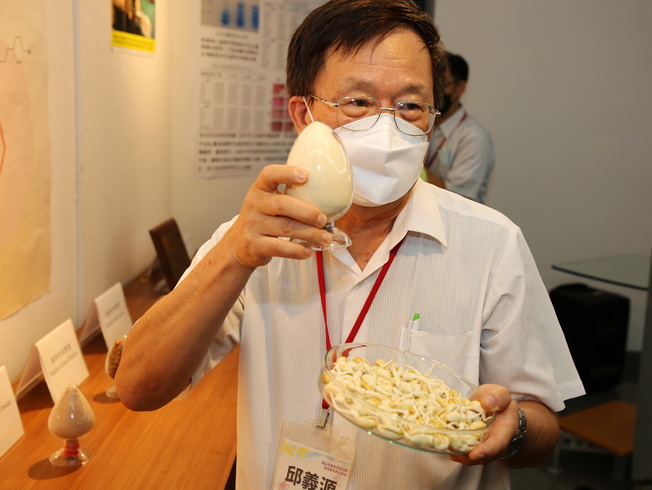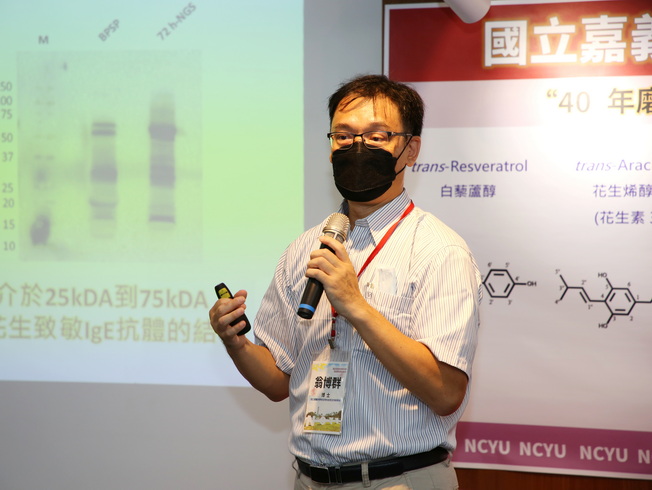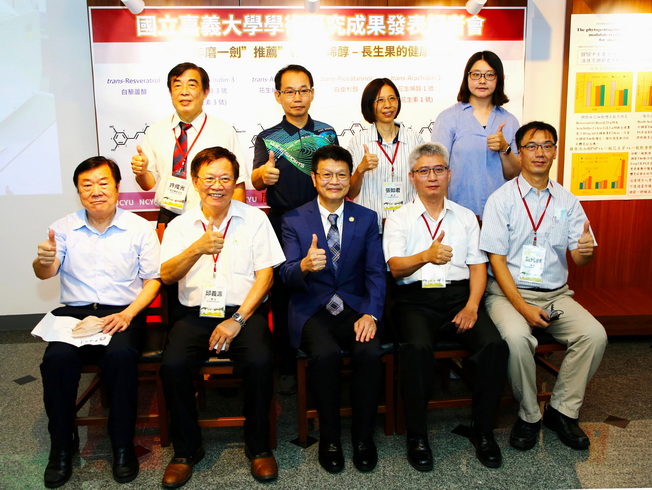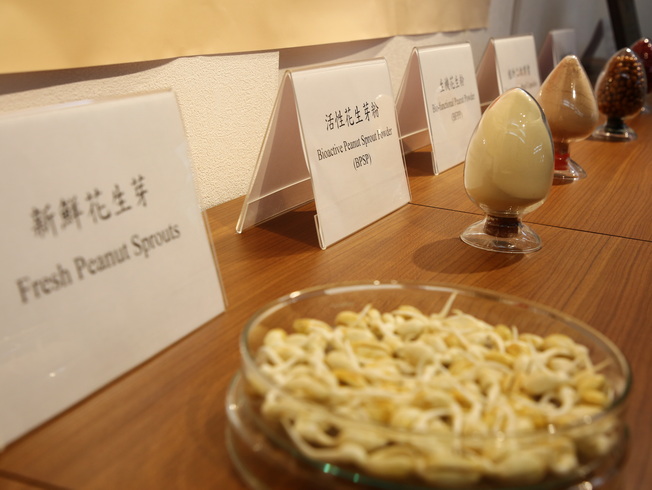| |
 |
News |
 |
Browsing: 1126 times

|
Date:2022-07-20
Bracket:2022 NCYU NEWS
Department:ncyu
|
 NCYU Former President Chiou Yi-Yuan Publishes Findings in Internationally Renowned Journals After Over 40 Years of Study: “Resverachidins” Can Effectively Inhibit Prostate Enlargement
NCYU Former President Chiou Yi-Yuan Publishes Findings in Internationally Renowned Journals After Over 40 Years of Study: “Resverachidins” Can Effectively Inhibit Prostate Enlargement
As Former President of National Chiayi University, Distinguished Chair Professor Chiou Yi-Yuan has been dedicated to peanut studies for more than 40 years and even in his retirement. On the morning of July 20th, a research and development results presentation was held at the Library and Information Building, Lantan campus. At the presentation, he first announced the definition of “resverachidins,” and the research findings of the NCYU research team: the bio-elicited peanut sprout powder (BPSP) is rich in resverachidins, which have proven to prevent food safety and allergy concerns, and effectively inhibit prostate enlargement. Both findings have been published in well-known international academic journals. The resverachidins in the bio-elicited peanut sprout powder have been found to be potential ingredients for health supplements for the elderly, which can help improve the health and quality of life for people in their advanced years.
In 2017, Former President Chiou and his research team discovered resveratrol and its more biologically active family component arachidin-1 in bio-elicited peanut sprout powder. After compulsory retirement in 2018, he has continued with his pursuit of scientific research with unwavering persistence, and has published two significant findings so far this year (2022). The first paper, published in the Journal of Food Science and Technology, includes key findings by both NCYU teachers and students and scholars from North Carolina State University and University of Illinois in the U.S. In the paper, resverachidins is officially defined as a large family of polyphenolic compounds including resveratrols and arachidins. According to results of pathological safety and acceptability tests, the bio-elicited peanut sprout powder shows a large tolerance range in terms of additive dosage when used as the functional food additives to dietary supplements. The food safety assessment test indicated that an equivalent consumption of 250g per day would not lead to lesions for an adult with a 60-kg body weight, based on the inspection results. This demonstrates the safety of consumption of bio-elicited peanut sprout powder, which provides key scientific evidence for developing diverse functional health-related supplements.
Prostate enlargement is a common aging problem that increases with age in men entering menopause. The inhibitory mechanism of arachidins is thus explored in another paper. Experiments have confirmed that the polyphenolic compounds of resverachidins in the bio-elicited peanut sprout powder can inhibit inflammatory swelling via radical-scavenging antioxidant, anti-inflammatory and hormonal modulatory pathways. The findings were published in the Journal of Functional Foods. According to the study results published earlier by Prof. Chiou, resverachidins can facilitate immune function of hormonal regulation. It is thus highly possible to relieve or inhibit prostate enlargement through hormone regulation, which shows great potential values for product development.
Former President Chiou said, as aging is irreversible, menopause is a transitional stage in which we move from middle age to old age. It is also the stage where we are prone to “three highs” highly linked to metabolic syndrome (high blood pressure, high cholesterol and high blood sugar), and where hormonal disharmony prevails. Hormones are signal molecules that play an important role in regulating metabolism in the body. With their small molecular weight and extremely low concentration in the blood, a slight concentration change may lead to irreversible consequences. So far, he has published findings on resverachidins covering a wide spectrum of issues: anti-oxidation, removal of free radicals, anti-inflammation, anti-glycation, anti-metastasis, tumor cell killing through autophagy, regulatory function of phytoestrogens, prostate enlargement inhibition, life extension, etc. These findings show that these healthcare functions are closely associated with the hormonal regulatory function of resverachidins. A timely and appropriate intake of dietary supplements with hormonal regulation activity is suggested for people undergoing the menopause stage. According to the research findings, it is highly possible for people navigating the fluctuations in the menopause stage, with the intake, to maintain a healthy state, foster a successful, smoother aging process, and enjoy a higher quality of life in advanced years.
In his remarks, NCYU President Han Chien Lin indicated that there are four reasons why the university should has a medical school. With three exceptional geographical advantages and two aspects of abundant teaching and research resources in the medical field, NCYU is the best choice to serve as a base for medical training. While creating a win-win situation for the affiliated hospital of NCYU, it will also allow the university to fulfill its social responsibility through building a new medical community fully equipped with smart technology and healthcare capacity in the greater Chiayi area. It is worthy of admiration that Former President Chiou Yi-Yuan has been devoting himself to peanut studies for over 40 years and even in his retirement. Throughout the years, he has made remarkable contributions to the science and industry related to peanuts. As his remarkable findings have again received high international recognition, it is testament to the abundant research and development capabilities of NCYU teachers and students in biomedical healthcare. It also marks a step towards the future establishment of a medical school at NCYU.
|



|
 |

|
 |
|
 |
 |
|


 ][
][